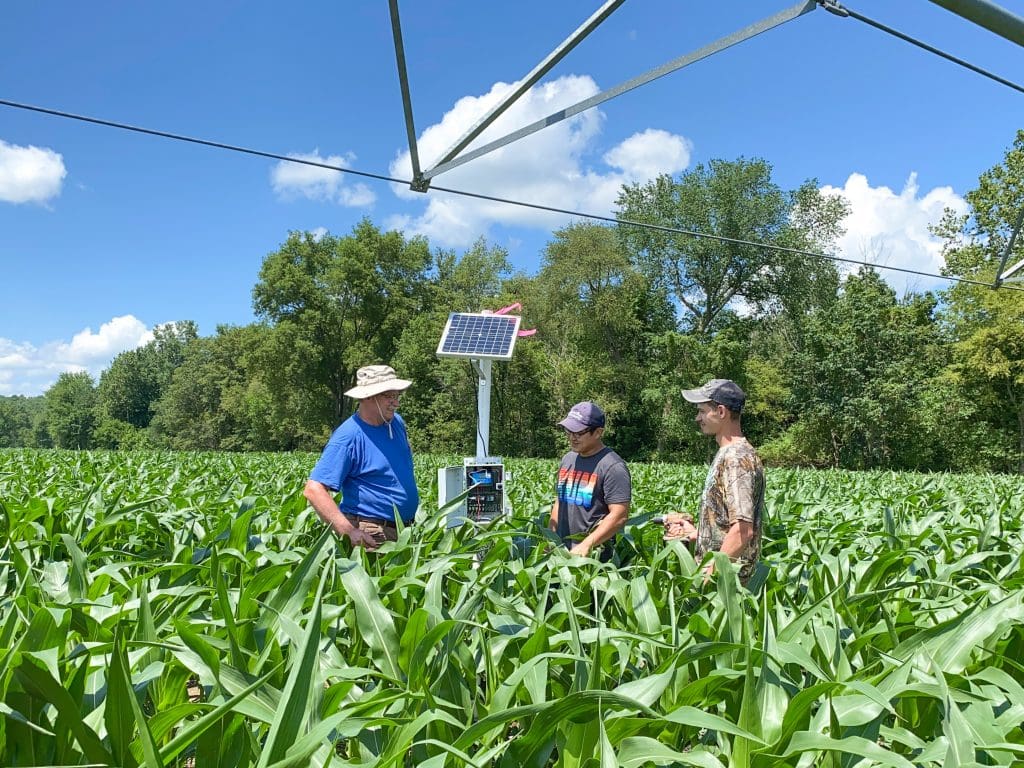Remarkable research projects that focus on food, fuel & fiber are underway at the Michigan State University AgBio Innovation Hub — but not for long. Many of these innovative projects that are funded by the Michigan Translational Research & Commercialization (MTRAC) program and MSU will likely move from the lab to the marketplace in the very near future for the benefit of all Michigan residents.
Sponsored by the Michigan Economic Development Corporation (MEDC), MTRAC is a statewide translational research and commercialization program whose purpose is to move technology out of the laboratory and early stages of development into commercial applications. Simply put, the MTRAC program is designed to ‘translate’ technology from the lab to the marketplace through licensing to an existing company or to a startup company.
There are five MTRAC hubs in the state housed at various Michigan universities. Each one focuses on a different technology that plays a strategic role in the state’s economic development: Wayne State University operates the Advanced Computing Innovation Hub; Michigan Technological University manages the Advanced Materials Innovation Hub; The University of Michigan operates the Life Sciences and Advanced Transportation Innovation Hubs; and MSU manages the AgBio Innovation Hub.

According to Joseph A. Affholter, Ph.D., director of the MTRAC AgBio program, the hub has received over $5.5 million from the MEDC, collected over 200 proposals, and funded nearly 120 projects over its 10-year history. Those projects have resulted in about nine startup companies, 18-19 commercial licenses, and over $140 million of additional funding to move the technology even further toward commercial use.
“Of the five hubs, the AgBio Innovation Hub is the broadest in terms of the scope of projects and technologies that it funds,” Affholter said. “On average, about one in 12 university technologies end up being successfully developed and commercialized. Our rate is better than one in six. So, engaging with the MTRAC AgBio program more than doubles the success rate. This is due to the direct contribution of a group of highly dedicated industry and university advisors and a unique, iterative team coaching process that is used with every MTRAC funded project.” Technologies funded by the AgBio Innovation Hub generally fall into five major industry categories, represented by letters A-E:
A – Animals
B – Bioprocessing, biomaterials and biomanufacturing
C – Crops
D – Diseases and pests (those affecting animals and crops)
E – Ecosystem/environmental
Many MTRAC-funded projects were showcased at the 2023 Great Lakes EXPO from Dec. 5-7. The Great Lakes Fruit, Vegetable, and Farm Market Expo and Michigan Greenhouse Growers Expo, held at DeVos Place in downtown Grand Rapids, is the largest annual agricultural trade show and educational event in the Great Lakes region. About 5,000 specialty crop growers, owner-operators, corporate representatives, and researchers were expected to attend, enjoying more than 70 educational sessions and workshops to pick from, as well as the opportunity to share ideas and concerns.
Moving technology from the lab to the marketplace
 Younsuk Dong, Ph.D., an MSU Assistant Professor and Extension Specialist at the MSU Department of Biosystem and Agricultural Engineering, is also a coordinator of the Great Lakes EXPO. He is an example of a faculty inventor who is very close to forming a startup company. Dong and his research team have created a system that will improve irrigation and plant disease management.
Younsuk Dong, Ph.D., an MSU Assistant Professor and Extension Specialist at the MSU Department of Biosystem and Agricultural Engineering, is also a coordinator of the Great Lakes EXPO. He is an example of a faculty inventor who is very close to forming a startup company. Dong and his research team have created a system that will improve irrigation and plant disease management.
“We wanted to develop technology that is low-cost and user-friendly to farmers,” Dong said. “MTRAC really supported us and gave us a lot of good suggestions. I had no idea who could manufacture this product, but they helped me find the right people to talk to. They really walked through the whole process with us from the beginning until commercialization of the technology.”
Mark Burns, the T.C. Chang Professor of Engineering at the University of Michigan with appointments in both chemical and biomedical engineering, wholeheartedly agrees that he would recommend working with MTRAC.
“Maybe you have a concept and you’ve shown that it sort of can work, but you know it needs a lot of work to actually get it out into the field and have an impact,” Burns said. “MTRAC allows you to do that focused translational work to push the device out into market.”
Burns and his team have been awarded two MTRAC AgBio awards for a precision irrigation technology for use in vineyards and orchards. The main purpose of the project is to conserve water by delivering the precise amount of water that each individual plant needs. The first grant supported the development of sensor cubes placed inside individual plants that use an algorithm to understand how much water each plant is using, while the second grant focuses on development of a technological device that can be controlled wirelessly to deliver to each plant the exact amount of water needed.
“I want to take this basic research, this technology I developed in my lab, and get it out into the world for use as a product,” Burns said. “That eye toward commercialization is a unique feature of MTRAC and a very powerful one. MTRAC encouraged us to do market and customer surveys so we could better understand the need. And we pivoted our research based on those discussions.”
Indeed, MTRAC helps acquaint faculty inventors with the ‘language of commercialization’ as they learn how to talk to potential customers, end users, regulators, and industry partners. At the same time, the commercialization process ‘de-risks’ technologies coming out of universities long before companies are ever presented with the opportunity to license them.
“As faculty go through an MTRAC project, they begin to hear and experience that customer discovery language and what it means to ‘de-risk’ a technology,” Affholter said. “How do you take a very high-risk, early-stage laboratory prototype of a device, a material, or a process and move it through stages that affect both its ultimate value in the marketplace and de-risk the potential pitfalls it could encounter in the marketplace?
“This is often the first time that researchers have heard that language and completed a project in which half the research they’re doing is not related to the technical questions that they answer in the lab,” he added. “So, they’re learning a lot about how to do research in the ‘laboratory’ of the marketplace.”

How MTRAC technologies help Michigan’s AgBio economy
Besides the benefits MTRAC provides to businesses and faculty inventors, MTRAC helps boost Michigan’s economy in several ways. First, it better positions important research being done in the state of Michigan for follow-up funding from federal agencies, corporate research grants, etc. Second, MTRAC funding increases the likelihood that the technologies that are developed in Michigan make it out into industry and eventually into the hands of consumers. Third, many corporate partners are based in Michigan, so licensing agreements ultimately improve their economic performance and competitiveness, as well as create jobs.
Finally, Affholter says the MTRAC program benefits Michigan indirectly, but perhaps most importantly, by positioning the MTRAC Innovation Hubs as places where people can achieve progress through translating scientific discoveries into commercial products.
“This whole ecosystem of innovation is intrinsically attractive to a large segment of those scholars coming into the university system and hoping to pursue entrepreneurial interests and develop the necessary skills,” he explained. “It gives them a context to work with and work from, as they are developing an educational or early career path. So, there’s a virtuous cycle here where it both produces things of economic value and also catalyzes the interest in scholars interested becoming producers of things that create economic value.”
MTRAC has funded numerous technologies that have been commercialized, including several that are focused on water purification. Affholter says he’s particularly excited about systems that use artificial intelligence (AI) to help make improved production decisions in fields, farms, forests and factories. One example of this is an emerging visual analysis system that helps livestock producers make nutritional and reproductive decisions that improve the wellness and productivity of their herds.
Several technologies funded by MTRAC will be on display at the Great Lakes EXPO, including a variety of crop improvement and crop harvesting technologies, such as artificial appendages that be used for picking different types of fruits and vegetables; AI information systems to help owner-operators and managers make decisions, improve record-keeping and enhance efficiency on matters related to irrigation, pesticides, nutritional applications, etc.; and post-harvest extraction tools that can transform waste into nutraceutical materials for both humans and livestock.
With thousands of people expected to attend, Dong says the Great Lakes EXPO provides a wonderful opportunity to network and share information with stakeholders in Michigan’s AgBio industry.
“Faculty inventors tend to stay at the university,” Dong said. “But in order to make an impact, we really have to talk to end users to translate what we found from the research to the practical in real life. The Great Lakes EXPO is great place we can share what we found, and hope farmers will adopt these new technologies. It’s also great place to get valuable feedback.”
Click HERE to learn more about the MTRAC Ag Bio-Supported technologies from MSU that will be at this year’s Great Lakes Expo.
About the MSU Innovation Center:
The MSU Innovation Center is dedicated to fostering innovation, research commercialization, and entrepreneurial activities from the research and discovery happening across our campus every day. We act as the primary interface for researchers aiming to see their research applied to solving real-world problems and making the world a better place to live. We aim to empower faculty, researchers, and students within our community of scholars by providing them with the knowledge, skills, and opportunities to bring their discoveries to the forefront. Through strategic collaborations with the private sector, we aim to amplify the impact of faculty research and drive economic growth while positively impacting society. We foster mutually beneficial, long-term relationships with the private sector through corporate-sponsored research collaborations, technology licensing discussions, and support for faculty entrepreneurs to support the establishment of startup companies.
